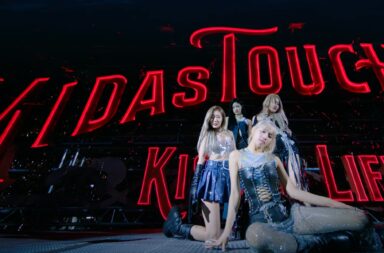 Note: This article contains references to dating violence and images that may recall sexual assault.
Note: This article contains references to dating violence and images that may recall sexual assault.
The nine-month wait following their previous comeback with “You’re the Best” has undoubtedly heightened anticipation for Mamamoo‘s latest release, “Décalcomanie”. The track certainly delivers musically, continuing to put a modern spin on Mamamoo’s funky retro style to further their signature sound. The melody line retains the rhythm and energy of swing, coupled with Mamamoo’s power vocals, while the bass incorporates a medium-tempo drum beat that injects the song with a different vibe from their previous title tracks. As great as the song is musically, though, no amount of honey vocals can sugar-coat how disturbing the MV’s willful normalising of dating violence is.
 If you’re reading this article, chances are you’re already aware of the controversy that “Décalcomanie” has been embroiled in because of this. Before getting down to this bone of contention, it may be useful to consider the title of the track to understand what it is trying to achieve. “Décalcomanie” is the French word from which decalcomania, the term for an art technique, is derived. While there are variations of the technique, its basics consist of pressing two surfaces together by hand to transfer ink or paint, resulting in a fractal, symmetrical pattern. There is also an element of unpredictability in the end-product, since it is not created stroke by stroke.
If you’re reading this article, chances are you’re already aware of the controversy that “Décalcomanie” has been embroiled in because of this. Before getting down to this bone of contention, it may be useful to consider the title of the track to understand what it is trying to achieve. “Décalcomanie” is the French word from which decalcomania, the term for an art technique, is derived. While there are variations of the technique, its basics consist of pressing two surfaces together by hand to transfer ink or paint, resulting in a fractal, symmetrical pattern. There is also an element of unpredictability in the end-product, since it is not created stroke by stroke.
The decalcomania trope recurs in the MV, such as in a top shot of Moonbyul dancing in a suit, and in other images of symmetry, like the mirror sequences. The lyrics point to decalcomania as a metaphor for two bodies pressing against each other during sex:
You and I, same picture, I feel good
An orange picture, I feel good
We made it together, we put it on each other
Like decalcomanie, I feel good
 Decalcomania as metaphor is in itself evocative and rich as an image, but it is the way the spontaneous quality of the metaphor is developed that plunges into ethically murky waters. This is not the first time that Mamamoo’s MVs have raised eyebrows for instances of sexual assault, but this is by far the most troubling episode.
Decalcomania as metaphor is in itself evocative and rich as an image, but it is the way the spontaneous quality of the metaphor is developed that plunges into ethically murky waters. This is not the first time that Mamamoo’s MVs have raised eyebrows for instances of sexual assault, but this is by far the most troubling episode.
In “Décalcomanie”, every member except Moonbyul has been subject to the all-too-familiar, yet no less insidious wrist grab. But Moonbyul’s kiss scene involves another disturbing cliché: the wall-slam. These actions may not appear to be outright assaults, but they cannot be divorced from the social context which renders them as symptoms of male violence and sexual aggression at large.
Solar‘s scene is the most explicitly violent one: the man grabs her wrist and pushes her against the wall of the lift. In a close-up of her hand that is chillingly reminiscent of the shower murder scene in Psycho, we see her struggling against his grasp before succumbing, presumably because of the kiss that is not pictured on-screen.
Beyond these actions, the situations in which the encounters take place are also disturbingly similar to settings where sexual assault often occur: at night, in lifts or elevators, in a car, in the deserted hallway of a hotel. The lyrics also contain several red flags, with lines like “It’s about to explode between us” sealing the connection between aggression as sexual attraction. Furthermore, the persona is aware that there is something “dangerous” going on, but still proclaims, “I’m trusting myself with you”.
The fact that these gestures have so often been passed off in K-pop cultural representations as spontaneous, passionate actions that makes female hearts flutter bears no repeating. What is especially troubling here is the consideration of Mamamoo’s image as strong, confident women. This is not at all to say that similar instances in the MVs of girl groups who do not have such an image should be condoned. But it suggests that it is normal for girls, whether they are vulnerable or strong, to accept such dating violence, or even to covet it.
 The outcry against the MV came to the attention of RBW Entertainment, who responded within 24 hours by taking down the original MV and editing out shots of Solar struggling, leaving her kiss scene and the rest of the MV intact. Though the agency should be given credit for the prompt response, the editing choice and Mamamoo’s remarks reveal a deeply unsettling mindset of turning a blind eye towards the core of the issue.
The outcry against the MV came to the attention of RBW Entertainment, who responded within 24 hours by taking down the original MV and editing out shots of Solar struggling, leaving her kiss scene and the rest of the MV intact. Though the agency should be given credit for the prompt response, the editing choice and Mamamoo’s remarks reveal a deeply unsettling mindset of turning a blind eye towards the core of the issue.
Though the most problematic part of the MV has been removed, images that practically equate sexual attraction with violence continue to persist. Following the climax of the kiss scenes, part of the choreography has the members mimicking the action of shooting, and it cuts to Hwasa setting off an explosion of some kind. The burning rose and shattering wine glass sequences interspersed with the kiss scenes add to the repertoire.
Above all, RBW Entertainment and Mamamoo not only fail to address the root of the problem, but wilfully deny it. During the media showcase for Memory, Solar remarks that they had “failed to take into account that different angles may lead to different interpretations”. This statement shoves the issue into the corner by figuring it as a matter of “angle” and “interpretation”, rather than facing it as a pervasive, deeply troubling fact. It is a complete shirking of social responsibility for the damaging portrayal of violence against women as an act of passion.
 The group also clarified that they had been going for a seductive femme fatale concept. Hence, Solar explained, the other members “played the girls who lead on and push men”. How peculiar, because the only people I see being pushed around in the MV are women, not men. Solar also added that she “played a contrasting role, to offer more diversity”. I’m just going to let the ridiculousness of this sentence marinate.
The group also clarified that they had been going for a seductive femme fatale concept. Hence, Solar explained, the other members “played the girls who lead on and push men”. How peculiar, because the only people I see being pushed around in the MV are women, not men. Solar also added that she “played a contrasting role, to offer more diversity”. I’m just going to let the ridiculousness of this sentence marinate.
The group’s statements also betray a lack of understanding of what a femme fatale is, and what it entails. Literally meaning “deadly woman”, the femme fatale is an archetype originating from film noir. A film noir story typically develops around a cynical male detective character who encounters a beautiful but seductive, double-dealing woman. She uses her sexual attractiveness and cunning to manipulate him, often bringing both of them to a downfall.
Just on the level of accuracy, the roles that Mamamoo play do not cohere with the femme fatale archetype. They are attractive and glamorously dressed in black—the signature colour of femmes fatales—but they do not take on the active femme fatale role of seduction; it is the man making most of the advances in each scenario.
 The importing of the femme fatale as concept here also displays a lack of awareness of how contested and problematic the archetype is: femmes fatales in film noir are usually punished for their transgressions, and are often treated by men as possessions. The femme fatale can and has been read subversively as an empowered agent in spite of these narrative qualities, but this reading is clearly not applicable in Mamamoo’s case.
The importing of the femme fatale as concept here also displays a lack of awareness of how contested and problematic the archetype is: femmes fatales in film noir are usually punished for their transgressions, and are often treated by men as possessions. The femme fatale can and has been read subversively as an empowered agent in spite of these narrative qualities, but this reading is clearly not applicable in Mamamoo’s case.
What also pains me is the potential “Décalcomanie” had, but flushed right down the drain of misogyny. I kept waiting for Solar to strike back, for the femme fatale-ness to show itself in each sequence, but instead the MV presented me with these images that glaringly endorse the submission of women to their aggressors.
 For what it’s worth, the idea of decalcomania and other visual motifs had the real potential to express female sexuality and passion creatively yet strikingly. There was a fascinating manipulation of slow-motion to evoke sexual tension in the shot of the puff of red powder from a makeup brush and the shots of fruits bursting. But the potential of these forms of expression were marred by the preceding gestures of violence. The shots end up feeling exploitative instead of evocative.
For what it’s worth, the idea of decalcomania and other visual motifs had the real potential to express female sexuality and passion creatively yet strikingly. There was a fascinating manipulation of slow-motion to evoke sexual tension in the shot of the puff of red powder from a makeup brush and the shots of fruits bursting. But the potential of these forms of expression were marred by the preceding gestures of violence. The shots end up feeling exploitative instead of evocative.
For instance, the aggressiveness in Solar’s original kiss scene ironically transforms the following shots of red rose petals hitting the ground into an image of violence rather than romance. The undercurrents of violence, combined with the dramatic silence, make the sequences of bursting fruit and blindfold-removing unbearable to watch, and the intended effect of tension gives way to extreme uneasiness.
 Where “Décalcomanie” goes wrong is not just in presenting acts of male violence against women without questioning them. What is more disturbing is how, through the glamorous setting and styling, and the invoking of the decalcomania art technique, both the MV and the song romanticise these acts. By couching them in the guise of romantic attraction, these acts are offered up as images of thrill and beauty, as something to be desired rather than denounced.
Where “Décalcomanie” goes wrong is not just in presenting acts of male violence against women without questioning them. What is more disturbing is how, through the glamorous setting and styling, and the invoking of the decalcomania art technique, both the MV and the song romanticise these acts. By couching them in the guise of romantic attraction, these acts are offered up as images of thrill and beauty, as something to be desired rather than denounced.
So much more can be said about this debacle, but I will just put in these last words. RBW Entertainment, Mamamoo, and the creative team of “Décalcomanie” need to get this straight: Sexual violence against women is not beautiful. It isn’t a “concept” or something to introduce “diversity”. It isn’t an “angle” or an “interpretation”. It’s an oppressive, traumatising, lived reality that is daily being trivialised and twisted into an illusion of normality and beauty, not by the media and popular culture—as though these mediums run themselves—but by the very people, people like them, behind these mediums.
MV Rating: 0.5/5
(YouTube, Images via RBW Entertainment, Lyrics via pop!gasa, Art Talk, Bridges Organization, Film Site: “The Greatest Femmes Fatales”, John Blazer: “The Femme Fatale“, Yonhap News, Dispatch)


